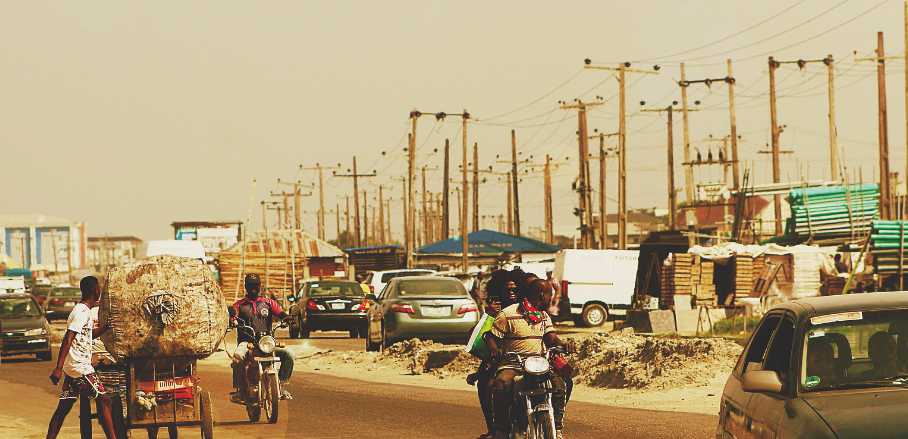Navigating Heterogeneity: The Way to a Just Energy Transition in the Global South’s Housing Sector
Achieving a just energy transition in the urban housing sectors of the Global South demands recognition and engagement with their heterogeneous energy networks and rapidly evolving spatialities. In this context, Marie Urfels explores the challenges of achieving a just energy transition while emphasising the importance to embrace these complexities to create targeted, context-specific solutions.
As the sun sets on cities like Lagos, Nigeria, families living in informal settlements face a daily struggle. Unreliable and expensive electricity connections force them to resort to unhealthy and unsafe alternatives, such as kerosene lamps and open fires, for lighting and cooking. But this is not only a challenge for those living in informal settlements. Millions of urban dwellers in the Global South struggle with access to regular power. Frequent power outages contribute to the dependence on petrol and diesel generators further exacerbating the issue, as they are both costly and environmentally harmful. Therefore, it’s crucial to address the issue of unreliable and limited access to regular power in the housing sector of rapidly urbanising regions.
Housing sectors in cities of the Global South face an intricate energy landscape, comprising grid-based electricity, petrol and diesel generators, and off-grid solutions. These energy sources provide varying levels of access to energy services and different patterns of energy consumption. Informal settlements, slums, and peri-urban areas often lack access to basic energy services and rely on traditional biomass fuels for cooking and heating, which can lead to indoor air pollution and health hazards. Meanwhile, formal settlements and middle-class neighbourhoods may have access to modern energy services but often consume energy inefficiently and are dependent on petrol and diesel generators as backup power sources due to suppressed energy demand from the electricity.
From Informal Settlements to Middle-Class Neighbourhoods: Addressing Diverse Energy Networks in the Global South
In cities of the Global South, embracing the heterogeneity within the housing sector is critical to achieving a just energy transition. As the concept of “just” energy transition in this sector goes beyond environmental sustainability and also prioritises social justice and equity, it is not only crucial to reduce greenhouse gas emissions but also to improve the quality of life for urban residents, particularly those in low-income communities and informal settlements.
Therefore, understanding the diverse needs of urban residents is crucial in developing tailored solutions for a just energy transition. For example, off-grid solutions such as solar home systems, biogas digesters, and community-based microgrids can be effective in providing basic energy services to households in informal settlements. However, in formal settlements and middle-class neighbourhoods, energy-efficient building designs, smart energy management systems, and incentives for energy-efficient appliances are more effective in reducing energy consumption and improving energy efficiency.
Partnering for Change: Key Collaborations for a Just Energy Transition
Collaboration between various stakeholders is essential to overcome these challenges and embrace the diversity of housing energy systems in cities of the Global South. Governments, NGOs, private sector actors, and local communities must come together to facilitate knowledge sharing, capacity building, and innovation, leading to more effective and sustainable solutions. By partnering these actors can expand access to microfinance and subsidies for clean energy technologies, invest in context-specific research and development, and pilot community-led initiatives. Collaboration can help to overcome these key challenges:
Access to finance can pose a significant challenge in the housing sector of the Global South, particularly for low-income households. Informal settlements and slums often lack proper land tenure and ownership, making it difficult to access credit for upgrades or improvements. Targeted financial support through grants, subsidies, or low-interest loans can help facilitate the adoption of clean energy technologies. Exploring innovative financing mechanisms such as microfinance, community-based financing, and public-private partnerships can also provide avenues for improving access to financing for clean energy solutions.
Limited technical capacity and expertise can hinder the adoption of energy-efficient technologies in the housing sector of cities in the Global South. To address this challenge, local governments, NGOs, and international organisations can prioritize capacity-building programs that provide training and technical assistance to enhance local expertise on making the heterogenous energy systems more sustainable.
Limited infrastructure and technology present challenges to a just energy transition in the Global South’s housing sector. In informal settlements, access to basic infrastructure such as reliable electricity and clean water remains a challenge. Meanwhile, in formal settlements and middle-class neighbourhoods, the adoption of clean energy solutions can be hindered by a lack of technical expertise. To overcome these hurdles collaborative partnerships between local governments, NGOs, and the private sector can develop innovative solutions that are appropriate for different neighbourhoods’ specific infrastructure and technological contexts. Investing in research and development can also help identify and address specific gaps in infrastructure and technology, making a just energy transition more accessible to all urban residents in the Global South.
In conclusion, achieving a just energy transition in the urban housing sectors of the Global South requires recognizing and embracing the heterogeneity of their energy networks and spatialities. By customizing solutions to the diverse needs of urban residents and building partnerships and collaborations among various stakeholders, we can create more targeted and context-specific solutions that prioritize social justice and equity in addition to environmental sustainability.
